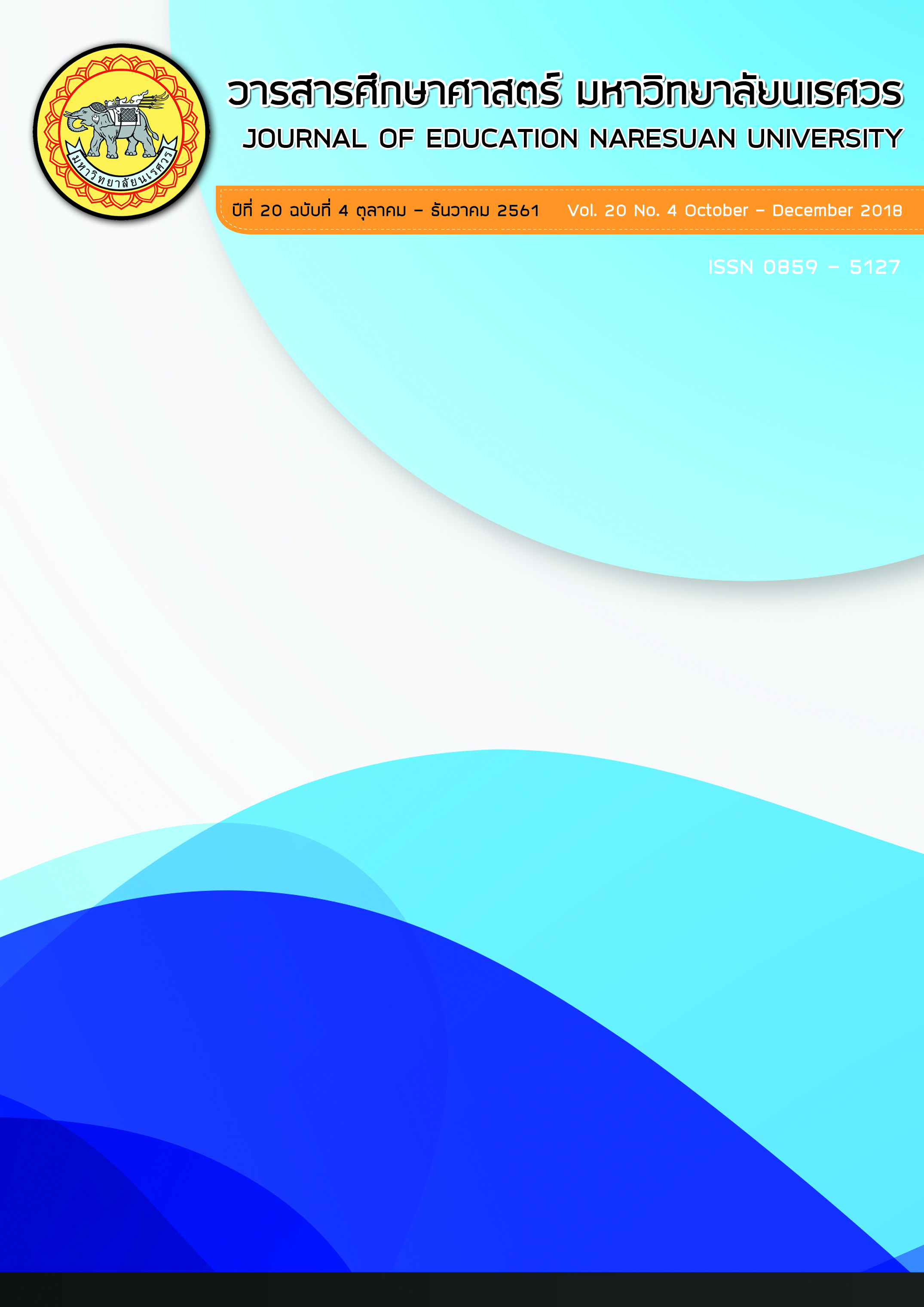การพัฒนาหลักสูตรเสริมสร้างสมรรถนะการวิจัยในชั้นเรียน สำหรับครูระดับการศึกษาขั้นพื้นฐาน; THE DEVELOPMENT OF CURRICULUM TO ENHANCE CLASSROOM RESEARCH COMPETENCY FOR THE TEACHERS IN BASIC EDUCATION SCHOOL
Main Article Content
Abstract
การวิจัยนี้มีวัตถุประสงค์เพื่อพัฒนาหลักสูตรเสริมสร้างสมรรถนะการวิจัยในชั้นเรียน สำหรับครูระดับการศึกษาขั้นพื้นฐาน โดยมีจุดมุ่งหมายเฉพาะ คือ 1) เพื่อศึกษาข้อมูลพื้นฐานที่จำเป็นต่อการพัฒนาหลักสูตร 2) เพื่อสร้างและตรวจสอบคุณภาพหลักสูตร 3) เพื่อทดลองใช้หลักสูตร และ 4) เพื่อการประเมินหลักสูตร การวิจัยครั้งนี้ดำเนินการตามระเบียบวิธีวิจัยและพัฒนา (Research and Development) โดยมีการดำเนินการ 4 ขั้นตอนคือ ขั้นตอนที่ 1 ศึกษาข้อมูลพื้นฐานที่จำเป็นต่อการพัฒนาหลักสูตร ขั้นตอนที่ 2 การสร้างและตรวจสอบคุณภาพหลักสูตร ขั้นตอนที่ 3 การทดลองใช้หลักสูตร และขั้นตอนที่ 4 การประเมินหลักสูตร กลุ่มตัวอย่างที่ใช้ในการศึกษาครั้งนี้ ได้แก่ ครูระดับการศึกษาขั้นพื้นฐานที่อาสาสมัครเข้าร่วมการใช้หลักสูตร ประกอบด้วย ครูในระดับประถมศึกษาและระดับมัธยมศึกษา จำนวน 30 คน เครื่องมือการวิจัย ประกอบด้วย หลักสูตร คู่มือการใช้หลักสูตร แบบทดสอบวัดความรู้ ความเข้าใจการวิจัยในชั้นเรียน แบบประเมินทักษะการวิจัยในชั้นเรียน และแบบวัดเจตคติต่อการวิจัยในชั้นเรียน โดยเครื่องมือทั้งหมดได้ผ่านการทดสอบคุณภาพแล้ว สถิติที่ใช้ในการวิเคราะห์ข้อมูล ได้แก่ ค่าเฉลี่ย (Mean) ค่าเบี่ยงเบนมาตรฐาน (Standard Deviation) และการทดสอบค่าที (t-test) ผลการวิจัย พบว่า 1) ผลการศึกษาข้อมูลพื้นฐานที่จำเป็นต่อการพัฒนาหลักสูตร คือ (1) เป้าหมายสำคัญเพื่อให้ครูผู้วิจัยเข้าใจมโนทัศน์ของการวิจัยในชั้นเรียน และให้ครูสามารถเขียนโครงร่างการวิจัย และเขียนรายงานการวิจัยได้ (2) หลักสูตรเสริมสร้างสมรรถนะการวิจัยในชั้นเรียน ประกอบด้วย เนื้อหาสำคัญๆ คือ หลักการแนวคิดเกี่ยวกับการวิจัยในชั้นเรียน จุดประสงค์การวิจัยในชั้นเรียน ลักษณะสำคัญของการวิจัยในชั้นเรียน ประเภทของการวิจัยในชั้นเรียน ความสำคัญของการวิจัยในชั้นเรียน วิธีดำเนินการทำวิจัยในชั้นเรียน การเขียนโครงร่างการวิจัย และการเขียนรายงานการวิจัยในชั้นเรียน 2) ผลการสร้างและตรวจสอบคุณภาพหลักสูตรที่พัฒนาขึ้นมี 8 องค์ประกอบ ได้แก่ (1) หลักการและเหตุผล (2) จุดมุ่งหมายของหลักสูตร (3) สมรรถนะที่มุ่งเน้น (4) โครงสร้างและเนื้อหาหลักสูตร (5) กระบวนการพัฒนา (6) ระยะเวลาการพัฒนา (7) สื่อการเรียนรู้ และ (8) การวัดและประเมินผล 3) ผลการทดลองใช้หลักสูตร พบว่า (1) ครูผู้เข้ารับการพัฒนามีความรู้ ความเข้าใจ
การวิจัยในชั้นเรียนหลังการพัฒนาสูงกว่าก่อนการพัฒนาอย่างมีนัยสำคัญทางสถิติที่ระดับ .05 (2) ครูผู้เข้ารับการพัฒนา มีทักษะการวิจัยในชั้นเรียนหลังการพัฒนาสูงกว่าเกณฑ์ละ 80 อย่างมีนัยสำคัญทางสถิติที่ระดับ .05 (3) ครูผู้เข้ารับการพัฒนา มีเจตคติต่อการจัดการเรียนรู้หลังการพัฒนาสูงกว่าก่อนการพัฒนาอย่างมีนัยสำคัญทางสถิติที่ระดับ .05 และ (4) ผลการประเมินหลักสูตรภายหลังเสร็จสิ้นโครงการ พบว่า ผลทั้ง 4 ด้าน คือ 1) ด้านปฏิกิริยา และ 2) ด้านผลลัพธ์ มีการพัฒนาการในระดับดี สำหรับ 3) ด้านการเรียนรู้ และ 4) ด้านพฤติกรรม หลังการพัฒนาสูงกว่าก่อนการพัฒนา อย่างมีนัยสำคัญทางสถิติที่ระดับ .05
THE DEVELOPMENT OF CURRICULUM TO ENHANCE CLASSROOM RESEARCH COMPETENCY FOR THE TEACHERS IN BASIC EDUCATION SCHOOL
This study aims to develop curriculum to enhance classroom research competency for the Teachers in Basic Education School with particular objectives as follows; 1) to study basic information necessary to the development of curriculum, 2) to create and inspect the curriculum, 3) try using the curriculum, and 4) evaluate the curriculum. This study was conducted subject to research and development regulations, consisting of 4 steps. The first step was to study basic information necessary to the curriculum development. The second step was to create and check quality of the curriculum. The third step was to test the curriculum. The fourth step was to evaluate the curriculum. The sample group of this study was 30 teachers who volunteer to joint curriculum implementation. The research instruments consisted of classroom research curriculum, handbook of classroom research curriculum, classroom research knowledge and comprehension test, classroom research skill performance test, and attitude to the classroom research test. All of research instrument were quality verification. The data obtained were analyzed using mean (), standard deviation (S.D.) and t-test. The study found that; 1) Findings from the studying basic information necessary to development of curriculum, was found that classroom research curriculum should have concept of classroom research, make to research proposal and research writing. And concept of classroom research consists as follows: aims, characteristics, types, important, methodology, proposal and research writing. 2) The result of creation and evaluation of the developed curriculum had 8 components as the following: rationale, objectives of curriculum, competency, curriculum structure and contents, development processes that using, development duration, instructional media, measurement and evaluation. 3) The curriculum test found that: (1) After the development, trainees had higher knowledge and understanding in classroom research than before the development with statistical significance level of .05., (2) after the development, teachers had higher skills than criteria by 80, (3) teachers had higher attitudes to learning management than before the development with statistical significance level of .05., and (4) the result of curriculum evaluation, one month after termination of the development project, in terms of reactions and in terms of results found that good level development, and in terms of learning and in terms of behaviors trainees had a higher level than before the development with a statistical significance level of .05
Article Details
The owner of the article does not copy or violate any of its copyright. If any copyright infringement occurs or prosecution, in any case, the Editorial Board is not involved in all the rights to the owner of the article to be performed.
References
Henry, C., & McTaggart, R. (1997). EAE 717 action research and critical social science. EAE 430/632, Unit Guide. Victoria: The Faculty of Education, Deakin University Press.
Katmeeritkajon, N., & Sawagpun, P. (2017). Local Curriculum Development to Promote Samut Sakhon Identity for Matayomsuksa 3 Students. Journal of Education Naresuan University, 19(2), 108-119. (in Thai)
Koongaew, A. (2006). Classroom research. Phetchabun: Phetchabun Rajabhat University. (in Thai)
Mills, G. E. (2003). Action Research: A guide for the Teacher Research (4th ed.). New York: Longman.
Moomark, M., Onthanee, A., W., Yatale, T., & Rinjalean, A. (2016). A Curriculum Development to Enhance Classroom Action Research Competency with Knowledge Management Network for Teachers. Journal of Education Naresuan University, 18(1), 1-9. (in Thai)
Office of National Education Commission. (1999). National Education Act of B.E. 2542 (1999). Bangkok: Seven Printing Group. (in Thai)
Sardo-Brown, D., Welsh, L. A., & Bolton, D. L. (1995). Practical strategies for facilitating classroom teachers' involvement in action research. Education, 115, 553-559. Retrieved from https://digitalcommons.wcupa.edu/profseced_facpub/1
Sittisomboon, M. (2003). The development of training curriculum on classroom research (Doctoral dissertation). Khon Kaen: Khon Kaen University. (in Thai)
Wongwanich, S. (2012). Classroom action research and teachers’ learning. Bangkok: The National Research Council of Thailand. (in Thai)


